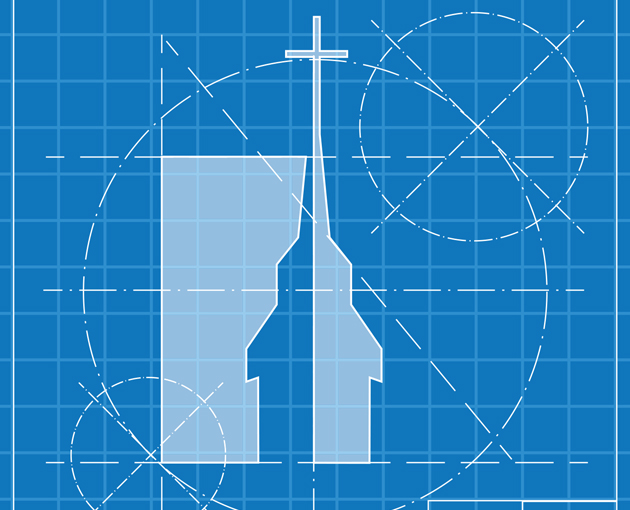The weekend of May 1 marked the one-year anniversary of the return of First Church to in-person Sunday worship services, following six weeks of government-ordered shutdown and quarantine from mid-March through April 2020. Pastor Doug Pratt saw this as a milestone: the beginning of the next chapter of this church’s life after a painful interruption. In his sermon, he reflected on this historic and challenging year and what lies ahead. This article is adapted from that sermon.
On September 1, 2019, Category 5 Hurricane Dorian’s eye made landfall on Abaco Island in the northern Bahamas and came to a near dead stop. It was buffeted by winds of up to 185 mph, over three feet of rain, and a 25-foot storm surge for several days. The municipal building in the center of a town was completely wiped out, leaving nothing but a concrete slab. When the evacuated residents returned, the mayor and city council were stumped by how to rebuild their historic town hall. All the building plans had been destroyed by floodwaters. The architect traveled to the national capital of Nassau and spent several days searching through old records. At last, he found the original blueprint tucked away in a government file drawer. Now armed with its original plans, the century-old landmark could accurately be rebuilt. The basic principle is this: after a storm, rebuilding correctly requires that we consult the original blueprint.
Profound Impact
The entire world has been through a devastating storm, a very slow one like Hurricane Dorian. It has lasted a long time—over a year. And this storm has had a profound impact on the human landscape. One historian wrote in the Wall Street Journal, that the global pandemic of 2020-2021 will prove to be the most disruptive event since World War II. Perhaps that is an over-statement, perhaps not. But the impact of what started from a microscopic organism in China has been wildly amplified by human responses.
We have only begun to catalog the toll of actual lives lost. Some died directly from the disease while other deaths were triggered by the virus in those whose health was already compromised. What will be revealed in time is how many more deaths were caused by people postponing screenings, tests, treatments, and preventive medicine while doctors and hospitals focused exclusively on one disease. How many additional suicides or deaths from overdoses were there? And then there are the harder-to-quantify psychological and mental health scars from fear, anxiety, panic, and isolation. The economic effects, the political effects, the educational effects, the real estate effects, the way careers have been altered, and homes relocated are even more difficult to quantify.
Reclaiming Our Purpose
Public health officials have assumed a prominent role, with their single-minded focus on physical health. As a pastor who sees himself as a Doctor of the Soul, I am convinced that the emotional, spiritual, and relational elements of our personal lives are just as important as the physical. We dare not risk putting our sole emphasis on a single aspect of life.
From a spiritual perspective, I have a great concern that even some Christians, under the relentless bombardment of government bureaucrats and media, have forgotten that God is still God. He has a purpose for all of us, and He has a time appointed for each of us. None of us will live forever, and none of us can live in a secure bubble that is danger-free. Thus, many of us need a spiritual revival, a renewal of our faith. We need a fresh reintroduction to the great and loving Father who knows every hair on our heads and has promised to never leave us or forsake us.
Just like us, many of our churches need to reclaim their purpose and rebuild their inner core. In previous great disasters, our natural impulse has been to flock to our churches. Remember the swell of worship attendance in the weeks following September 11, 2001? But in this COVID-19 crisis, people have avoided their churches—with significant spiritual consequences.
It has been a very hard year for many Christians, many pastors and church leaders, and many congregations across North America. But there is no justification for us to wallow in self-pity. Other Christians in other parts of the world, now and at other times in history, have had a much tougher environment. When Communism took over Eastern Europe and China in the 1940s, experts predicted that the church in those countries would die. It did not. Believers found ways to survive, thrive, and flourish. The earliest days of the Christian movement began in the highly hostile environment of the Roman Empire. Somehow, they not only survived waves of persecution but also managed to change the world and win millions of unbelievers to Christ. So I am not ready to give up. We have the same Holy Spirit they did. Our times might be hard, but they are not impossible.
The Original Blueprint
Just as the architect in the Bahamas needed to consult the original blueprint, so do we. It is found in the New Testament, most uniquely the Book of Acts—an amazing story of courageous Christians and the blueprint for the first-generation Christian Church. These believers found the balance of worship, fellowship, prayer, and engagement in their community. The rest of the New Testament gives us more detail of what a thriving church is to look like. With no previous example to follow, Peter, Paul, and the other leaders figured it out. They were adaptable, flexible and creative.
It is this same flexibility of the Christian faith that has allowed it to fit into nearly every culture, nation, and people group. Because the Bible’s message deals with the most important issues of life and is grounded in the nature of God that never changes, we never have to make the gospel “relevant.” It is always relevant.
A New Reality
The world we live in is not only deeply scarred by this unexpected pandemic but also deeply confused and spiritually lost. The culture in which most of us grew up—if not totally supportive of Christian values, at least not completely hostile to them—is rapidly changing. Openly-professing believers in Christ find themselves in the position of an oppressed and persecuted minority in many places across North America, and we are not used to this.
This was also the reality for the first generations of Christians, which makes the New Testament even more relevant and powerful for us. If they could live out their faith in the face of that resistance, we can do it too—because the same Holy Spirit that lived in them is also in us. But to be successful, we must keep ourselves pure and uncompromised, keep our spiritual lives in touch with our Lord, and keep loving and working together as a church—just the way the blueprint shows us in Acts 2.
All the believers devoted themselves to the apostles’ teaching, and to fellowship, and to sharing in meals (including the Lord’s Supper), and to prayer… And all the believers met together in one place and shared everything they had. They sold their property and possessions and shared the money with those in need. They worshiped together… and shared their meals with great joy and generosity—all the while praising God and enjoying the goodwill of all the people. And each day the Lord added to their fellowship those who were being saved. – Acts 2:42, 44-47 (NLT)
by Pastor Doug Pratt






